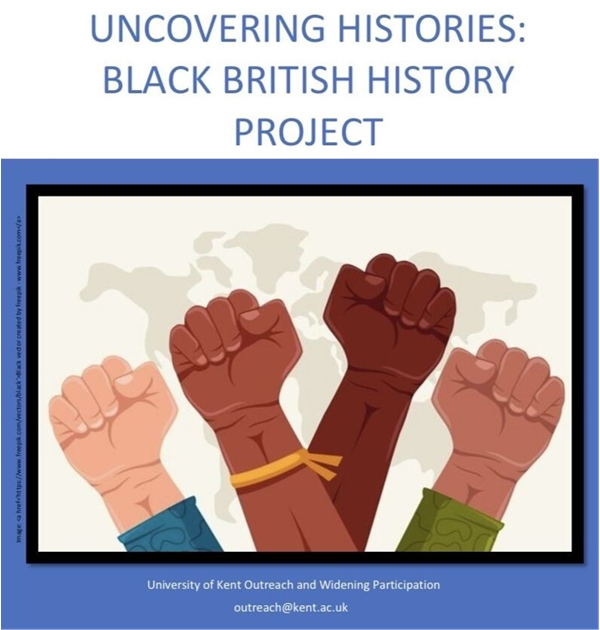My name is Glory Oluwaseun, and I am a Development Ambassador at the University of Kent. In this role I create Outreach curriculums and initiatives, and I have designed a program called ‘Uncovering Histories’ to teach students about Black British History.
This program is my most significant achievement to date. I firmly believe that education provides the tools to address many inequalities in our society, particularly racism. In creating this program, while the content we were teaching was significant, the faces that were doing the teaching were of equal importance. I wanted to show students that higher education can be a place for them, and I did not just want to educate but also to inspire.
The program was structured with 30-minute interactive teaching sessions twice a week. The sessions were either led by an academic who taught students about a part of Black British History or by me and another ambassador teaching students vital skills, such as critical thinking to help them through the program.
Week one got off to a phenomenal start with a session looking at the African presence within ancient Britain, led by Dr Karl Goodwin, a lecturer at Canterbury Christ Church University. Dr Goodwin taught students about the lack of representation of Africans in British museums, highlighting notable figures such as Septimius Severus and the Ivory bangle lady. I led session two, which was an empowering experience for me. Students learnt how to critically analyse the information they are given through questioning sources, its credibility and how it realistically compared to their life experiences.
The second week began with a proud historical outlook at Black women in STEM by Dr Barbara Adewumi, a postdoctoral researcher at the University of Kent (UoK). She also provided a whistle-stop tour on literature reviews and the significance of compiling diverse resources beyond textbooks. Session two was led by Dr Aparajita Mukhopadhyay, Lecturer in History at UoK, who taught students about how Africa was colonised and how it is still colonised today!
In week three students were very engaged and were joined by Dr Ben Marsh, Lecturer in History at UoK, whose lecture taught students about Kent’s links to the British empire and how exchange and migration began in the sixteenth century. Through Dr Marsh’s session students were able to get a glimpse of historical Black people in and around Kent. I had the amazing opportunity to lead the next session with another Outreach Tutor, Emmanuelle Ogunlola. Using the archival sources which included newspaper advertisements of runaway Black people provided by Dr Ben Marsh, students were able to deeply analyse the contents critically, creating stories to explain the characters.
By week four momentum was building with a double lecture presented by guest speakers Dr Mark Ledwidge (International Politics consultant) and Dr Alexander Hensby, UoK Sociology Lecturer. Dr Ledwidge uncovered hidden aspects of African history intentionally obscured by racist ideology. He taught students about the world’s FIRST university in ancient Africa, Timbuktu and the 25th Dynasty of Egypt! Bringing us right up to modern times, Dr Hensby’s lecture looked at the Black Lives Matter movement as a social movement and their use of social media to help increase awareness and understanding of the effects of structural racism.
Week five was the program’s final week and provided a grand finale to help conclude what students had learned. Session one was led by Rachel Gefferie, a PhD candidate in the School of Anthropology and Conservation, UoK. Rachel taught students how to embed their identity into what they learn through exploring her own research on her home country Suriname. The second session was led by me and Outreach Tutor and Ambassador Emmanuelle Ogunlola, where we gave students time to work on their curriculum proposals for the class competition.
For me personally, this program is a form of activism, motivated by my vision for change within the education system and my desire to raise awareness of Black history beyond the month of October. This program was a year in the making and was a labour of love, and I am grateful to every academic that saw something important in this program and took part in creating resources and helping us in our goal. I am also incredibly thankful to Shauna-Aine O’Brien and Dr Alexandra Martin-Carey, who work in the UoK Partnership Development Office (PDO). I came to them with this idea, and each step of the way they helped me create this program and stay true to my vision.
As a proud Nigerian I know where I come from and, in turn, who I am. I know that many people do not have this same privilege, so I am doing my part to shine a light on my ancestors’ forgotten histories. Despite this, I learned so much in this five-week program, but this is not enough. More needs to be done. The team are currently planning to evaluate the program and are looking at ways to expand and continue this meaningful work; this is truly just the beginning.

